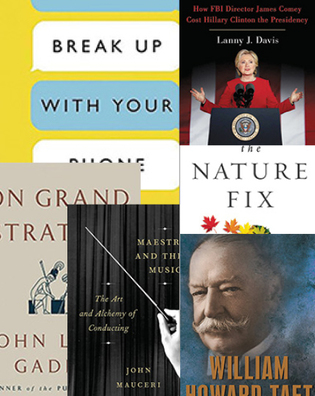 loading
loading
Arts & CultureOutputTo have your book, CD, app, or other work considered for Output, please send a copy to Arts Editor, Yale Alumni Magazine, PO Box 1905, New Haven CT 06509; or e-mail a copy or link to [email protected].  View full imageHow to Break Up with Your Phone “We’re inseparable now, you and I. You’re the last thing I touch before I go to bed and the first thing I reach for in the morning,” says Price, in an admission that would warm the heart of any mate. But the science journalist isn’t talking about her spouse; she’s describing her addiction to her smartphone. In this provocative little book, Price explains why you need to unplug. She also provides a 30-day detox program to help people take “back their lives from their phones.”
Maestros and Their Music: The Art and Alchemy of Conducting Mauceri, who picked up the baton a half century ago, has worked with the likes of Leonard Bernstein, given innumerable concert appearances, and taught music at Yale for 15 years. So there’s probably no better guide to “the great mystery of the conductor.” In a wise and well-illustrated exploration of this “strange and lawless world,” Mauceri explains the mysteries of his craft.
William Howard Taft The presidency of William Howard Taft, Class of 1878, will always be overshadowed by that of Teddy Roosevelt, his friend, supporter, and, ultimately, political rival. But in this compact biography of the only US president who also served as Chief Justice of the Supreme Court, Rosen paints Taft as a principled executive and judicial expert. Taft embraced the restraints imposed by the Constitution, Rosen writes, to prevent the country’s degeneration “from a representative republic into a direct democracy,” a system that could enable “populist demagogues” to “flatter the people into subverting the constitutional order.”
On Grand Strategy “The fox knows many things, but the hedgehog knows one big thing,” wrote the ancient Greek poet Archilochus: the fox has lots of tricks, while the hedgehog relies only on the protection of its spines. Diplomatic historian John Lewis Gaddis, cofounder of Yale’s program in grand strategy, argues that leaders have their best successes when they combine agility with a sense of direction. Of course, they must know when and how to use each approach. If, for instance, you maintain a hedgehog’s fixation on your goal while making foxlike use of flexibility as the need arises, you have a better chance of aligning “potentially unlimited aspirations with necessarily limited capabilities.”
The Unmaking of the President 2016: How FBI Director James Comey Cost Hillary Clinton the Presidency “The single, decisive reason” that Hillary Clinton ’73JD does not now occupy the Oval Office is, according to Davis—a lawyer who served in both the Bill Clinton ’73JD and George W. Bush ’68 administrations—the letter that FBI chief James Comey sent to Congress less than two weeks before the vote. That letter announced the discovery of a potentially damaging collection of Hillary’s missing e-mails. Although nothing damning was ever found, the fallout, carefully documented by Davis, may have enabled Donald Trump to “achieve the highest office in an impaired election process.”
The Nature Fix: Why Nature Makes Us Happier, Healthier, and More Creative In barely a generation, our species has experienced an “epidemic dislocation from the outdoors,” writes environmental journalist Williams. The cause is the “confluence of demographics and technology” that has turned us into primarily urban animals. According to abundant research she artfully presents, that shift comes with a cost: an increase in such ailments as myopia, Vitamin D deficiency, obesity, depression, loneliness, and anxiety. Williams shows how a regular dose of nature can benefit our health, our relationships, and even our civilization. How big a dose? The Finns, recently ranked first in the World Happiness Report released by the UN, recommend at least five hours a month.
The comment period has expired.
|
|